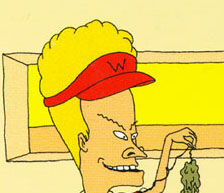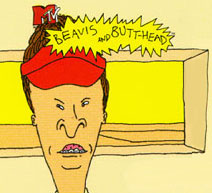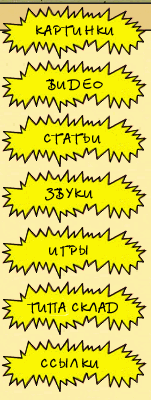|
Beavis and Butthead Charm the Intelligentsia
"They are the children of nature of whom [Jean-Jacques] Rousseau dreamed,
people free from the conventions of culture. They do what we think but
cannot allow ourselves to express."
- Yury Saprykin, a columnist at Kompaniya magazine.
Beavis and Butthead are doing Russia. And from the literary salons to the
quality news media to academic writings, the nation's loftier intellectual
circles are enthralled.
The two inarticulate cartoon friends - famous for their raging teenage
hormones, their stupidity, their opaque slang and their love of hard rock
- have for years been the trademark program on MTV.
Now the American cult phenomenon is taking hold in Russia, where a local
MTV product has been on the air for the past five months. MTV Russia can
be seen today in Moscow, St. Petersburg and 10 other cities, and is also
included in the basic package of NTV Plus satellite pay television.
As in America, Beavis and Butthead are first and foremost a teenage
phenomenon.
"Ever since the appearance of a local Russian MTV, the presence of Beavis
and Butthead has been impossible to ignore," Izvestia reported last month.
"Whenever more than three teenagers get together, one of them invariably
starts giggling like Beavis and mooing like Butthead."
What's new in Russia is that Beavis and Butthead have captivated the
intelligentsia as well.
"There is something attractive about them. I couldn't go to bed without
watching Beavis and Butthead," said Vadim Kurilov, a teacher of English.
"They have a certain semantic system that can be grasped very quickly, and
it sticks with you. It's so easy to say 'Beavis, it's cool - heh, heh!'"
Kurilov confesses to having watched the cartoon every night for two months
straight before his interest finally began to wane. He continues to watch
occasionally.
And he is not alone. Vyacheslav Kuritsyn, a respected culture critic, has
written sophisticated literary and cultural deconstruction papers using
Beavis and Butthead slang. Cultural commentator Saprykin - he who sees the
two arch-cretins as Rousseau's noble savages - makes a point of watching
the show each morning for a daily "charge of cheer and healthy cynicism."
And at a recent literary salon evening, poet and translator Sergei Moreino
used the cartoon as the benchmark for greatness in cinematography. In
comparing the art of the two famous Russian film directors, Andrei
Tarkovsky and Nikita Mikhalkov, Moreino concluded that Tarkovsky's work is
better than "Beavis and Butthead," and so "great," while Mikhalkov's work
is worse than "Beavis and Butthead," and so "not great."
Among those who have sought the weighty significance in it all is
Izvestia, which came to the conclusion that thanks to Beavis and Butthead,
in polite conversation it has now become "easy to fill a strained pause
with the phrase, 'It's, like, cool and all!' You appear not an idiot but a
natural joker. An important mission has fallen to Beavis and Butthead:
they assume other people's mediocrity, narrow-mindedness and cretinism."
Using rude or humorous slang has obvious attraction to young people around
the world - but there is also historical precedent for it holding
attraction to Russia's ***intelligentsia***. There is something of a
tradition among intellectuals - who are angst-filled over their inability
to find a common tongue with the good simple Russian people - to use foul
language to bridge the gap.
Beavis and Butthead don't exactly use profanity. But the language they
speak - particularly as "translated" by Russian MTV - suits the purpose
well.
The voices of both characters are supplied by Lenkom Theater actor Sergei
Chionishvili. But the charm is in the translation, and that has been
ingeniously supplied by Maria Gavrilova - who gathered her vocabulary by
calling her friends to ask them to try to remember the jargon of their
youth, andinterrogating teenagers.
"I knew [Beavis and Butthead] could speak Russian, and they have begun to
do so," Gavrilova said. "Now they have, to an extent, taken on a life of
their own."
To translate the crucial slang word "cool," Gavrilova not only used the
everyday ***kruto,*** but also revived the nearly forgotten and far
sillier ***klyovo.*** The chief concern of the two friends - their
"wieners" - in Russian becomes either ***perets,*** a pepper, or
**porshen,** a piston. Girls are ***tyolki,*** young female cows.
Beyond that, anything remotely close to literal translation of many
commonly used "Beavis and Butthead" words is impossible. "Sucks" became
***otstoi,*** which usually means sediment. Instead of the more esoteric
"buttmunch" or "dillweed," Gavrilova's Beavis and Butthead offer
interjections like ***baklan,*** which means a cormorant, or ***pelmen,***
as in pelmeni dumplings.
"It is so stupid that it becomes simply funny," said Gavrilova of the
"Beavis and Butthead." She added that she has developed a maternal feeling
toward the two cartoon losers. "I feel sorry for them," she said.
The Communist Party has yet to take a position on Beavis and Butthead. But
in Russia, as in America - where Beavis and Butthead have even been cited
on the floor of the U.S. Senate as evidence of the decline of modern
society - there are those who worry about what their popularity
represents.
Dmitry Shafro, for example, a university student, worries when he hears a
Beavis and Butthead catch phrase slip into his own vocabulary.
"Americans created [the show] as a parody of their society, and they laugh
at it," Shafro said. "Our people have pervertedly perceived it as a new
culture."
|











